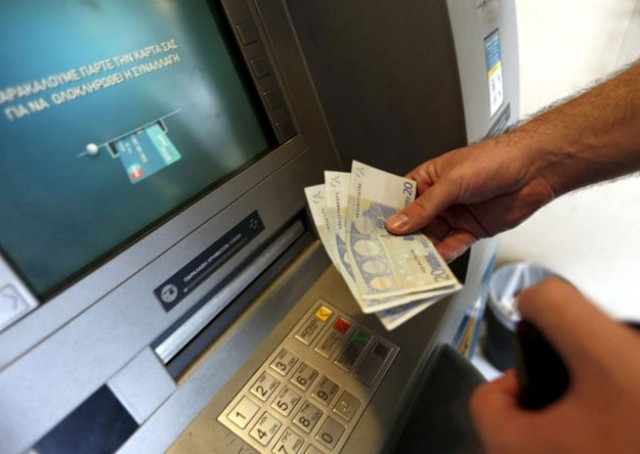Banks reopen, taxes hiked as Greece seeks to reboot economy
Bank shutdown is estimated to have cost Greece's economy $3.3 billion in market shortages, export disruption

PHOTO: REUTERS
The bank shutdown since June 29 is estimated to have cost Greece's crisis-hit economy 3.0 billion euros ($3.3 billion) in market shortages and export disruption.
Capital controls including a block on key transfers to foreign banks and a ban on the opening of new accounts remain in force, although a daily cash withdrawal limit of 60 euros ($65) has been relaxed.
Louka Katseli, the head of Greece's bank association, said Greeks would now be able to withdraw a maximum of 300 euros at once until Friday, when a new weekly limit of 420 euros comes in force.
The government is meanwhile expected to make a 4.2 billion euro payment Monday to the European Central Bank (ECB), made possible by a short-term "bridge" loan of 7.16 billion euros granted by the European Union on Friday.
The loan will also allow the debt-crippled Greek government to make payments to the International Monetary Fund (IMF) outstanding since June.
Greece's radical left government last week agreed to tough reforms — including tax hikes, an overhaul of the ailing pension system and privatisations it had previously opposed — in exchange for a three-year bailout of up to 86 billion euros that it is hoped will stop it crashing out of the Eurozone.
Taxes went up in Greece on a wide range of goods and services on Monday — everything from sugar and cocoa to condoms, taxis and funerals — from 13 per cent to 23 per cent.
On the other hand, the tax on medicines, books and newspapers eased from 6.5 per cent to 6.0 per cent.
Katseli said some 40 billion euros have been withdrawn from Greek banks since December by customers anxious over the safety of their deposits, seriously damaging the banks' ability to function normally.
She urged Greeks to bring their savings back to the banks to support the crisis-hit financial system.
"If we take out the money from our safes and our houses — where, in any case, it isn't safe — and we deposit it in the banks, we will reinforce liquidity," she told the Mega TV channel.
For the first time in months, technical teams representing the creditors — the European Union, the ECB and the IMF — are expected in Athens in the coming week to assess the state of the economy.
The austerity package caused a mutiny among lawmakers of the ruling radical Syriza party, forcing Prime Minister Alexis Tsipras to carry out a limited reshuffle on Friday.
Even so, most analysts and even government officials say early elections are now inevitable, and are likely to be held in September.
Tsipras' critics accuse him of being blackmailed by Greece's creditors, who had threatened to expel the country from the Eurozone.
German Chancellor Angela Merkel on Sunday reiterated Berlin's tough stance ruling out debt forgiveness for Greece, but added that her government was open to more flexibility in Athens' repayment schedule.
"There can't be a classic haircut — forgiving 30 or 40 per cent of debt — in a monetary union," Merkel told public broadcaster ARD.
But she noted that Greece had received other forms of debt relief in recent years including a "voluntary writedown for private creditors, extended maturities and lower interest rates".
"We can discuss possibilities along those lines again," she said.
Meanwhile Tsipras — who barely has time to eat or sleep, according to his mother — faces a fresh challenge on Wednesday when parliament must approve a second wave of reforms tied to its economic rescue.
Pro-government newspaper Avgi on Sunday said the vote would be a "crash test" that could even result in the prime minister's resignation.
"If there are new losses, in whatever form, (Tsipras) will hand back his mandate," the daily said.
Nobel prize-winning economist Paul Krugman, a vocal supporter of Athens in its long-running bailout saga, said Sunday that he "may have overestimated the competence of the Greek government," suggesting that Syriza staged the showdown without having a Plan B.
The draconian agreement — accepted by a party that came to power in January promising to end austerity — came after more than 61 per cent of Greeks rejected further cuts in a July 5 referendum called by Tsipras himself.



















COMMENTS
Comments are moderated and generally will be posted if they are on-topic and not abusive.
For more information, please see our Comments FAQ